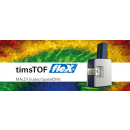应用领域:细胞生物学,蛋白/抗体/蛋白质组,基因/基因组/测序,多组学/蛋白质组/代谢组/脂质组,生物制药/仿制药
检测样品:Tissue sections from frozen TCEA- positive and WT mouse stomachs
检测项目:imaging
参考标准:-
timsTOF fleX with PASEF enables deeper proteome coverage in shortest possible time, always with high sensitivity and robustness.
Abstract
The timsTOF fleX offers a combination of two unique technologies, namely Trapped Ion Mobility Spectrometry (TIMS) to enhance ion separation and sensitivity and Parallel Accumulation Serial Fragmentation (PASEF) to improve ion utilization efficiency and data acquisition speed. In this application note, we demonstrate the performance of the timsTOF fleX mass spectrometer with PASEF for label-free quantitation of proteins extracted from sectioned mouse tissue. In brief, more than 5000 protein groups could be reliably identified and quantified from 240 ng protein per sample using 90-minute gradients. The optimized PASEF method used on the timsTOF fleX resulted in very high technical reproducibility which is an important prerequisite for label-free quantitation (LFQ). Furthermore, the complete process (including tissue preparation, digestion, and data acquisition) was highly reproducible, which is critical in the application of proteomics to clinically relevant specimens. When comparing the proteome composition of tumor and non-tumor tissue, gene ontology analysis indicated the enrichment of the minichromosome maintenance protein complex (MCM-complex) in tumor over non-tumor samples. The MCM-complex has been shown to be an essential component of the pre-replication complex (pre-RCs), which is involved in DNA replication initiation and the recruitment of DNA-Polymerases. In various studies a malfunction of the MCM-complex has been linked to genomic instability, increased cell pro-liferation, and a variety of carcinomas.





